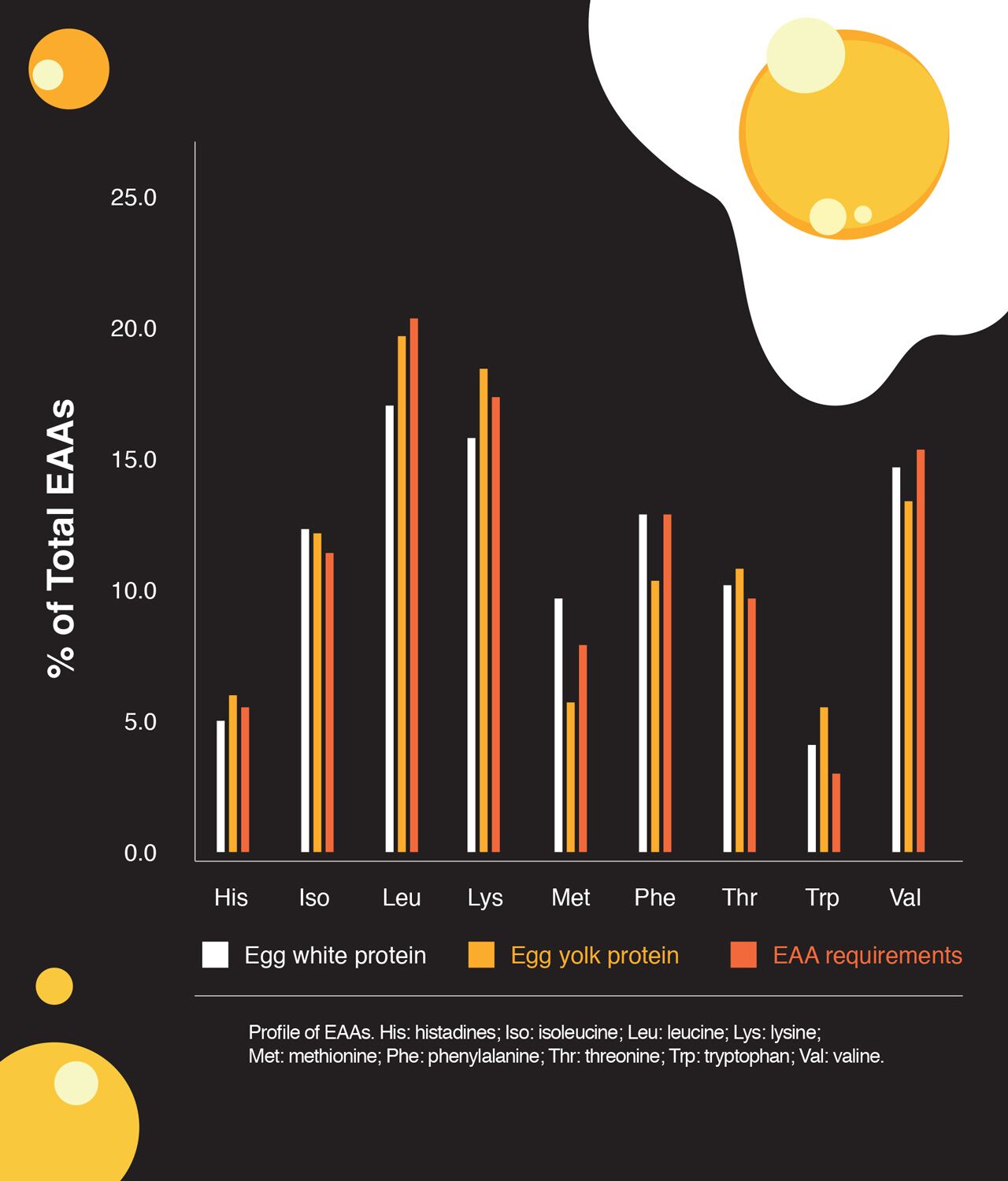Did You Know You Can Find All the Essential Amino Acids in Egg Whites?
 By: by Amino Science
By: by Amino Science

Many nutrition experts consider eggs to be one of the healthiest foods in the world. Including eggs in your diet can help you meet your dietary protein intake goals. Egg protein is of particularly high quality since it contains all nine essential amino acids. Given how few calories the whites content, it's common for individuals seeking to lose weight or limit cholesterol intake to eat them on their own—and yes, you can find all the essential amino acids in egg whites.
In fact, egg whites are as close to a pure amino acid supplement as you can get in a naturally occurring protein food source. Egg whites are composed of nearly 100% protein with no fat or cholesterol. The egg white in an average large egg contains approximately 16 calories and 3.4 grams of protein, with essential amino acids comprising 40% of the total amino acids. Pretty impressive!
But why is it so important to ensure your diet includes foods that provide all essential amino acids? Read on to learn more about the importance of amino acids to your health and well-being, as well as why eggs and egg whites are such valuable sources of amino acids.
Why Are Amino Acids Important?
The body is largely composed of thousands of proteins. Proteins are made of strings of amino acids hooked together in a specific order. All of the proteins in the body are in a constant state of turnover, meaning older proteins get broken down and replaced with newly synthesized ones. During this process, amino acids are released. While many of these unchained aminos can then be reutilized to help make new proteins, others are irreversibly oxidized and therefore unavailable for protein synthesis.
There are two general types of dietary amino acids: those that can be produced by the human body, which are called nonessential amino acids, and those that must be obtained through the diet, which are called essential amino acids.
Essential amino acids are the only macronutrient required in the diet for survival. High-protein foods that contain all the essential amino acids are deemed to be complete protein sources. The primary sources of essential amino acids for most people tend to be meat, fish, dairy, and eggs, though it is possible to get all your essential amino acids from plant-based complete protein sources. Because of their vital importance, there are dietary requirements for each of the nine essential amino acids:
- Histidine
- Isoleucine
- Leucine
- Lysine
- Methionine
- Phenylalanine
- Threonine
- Tryptophan
- Valine
There are no dietary requirements for the 11 nonessential amino acids, however, since they can be made in the body.
That said, you will get additional nonessential amino acids from high-protein foods, as all dietary proteins that contain essential amino acids also contain nonessential amino acids.
Using Essential Amino Acids to Determine Protein Quality
International standards for protein quality come from a scoring system developed by the Food and Agriculture Organization of the World Health Organization. The scoring system, called the Digestible Indispensable Amino Acid Score (DIAAS), takes into consideration key elements such as:
- Proportion of essential amino acids to nonessential amino acids
- Profile of essential amino acids relative to the individual dietary requirements for those amino acids
- Protein utilization efficiency, meaning how well the body can digest it
Egg white protein—made up largely of a protein called albumin—has one of the highest DIAASs known. This is due not only to the fact that over 40% of the total amino acids are essential aminos, but also to the specific profile of the essential amino acids in egg whites.
The figure below shows the profile of essential amino acids in egg whites and egg yolk compared to the profile of essential amino acid requirements. You can see how the essential amino acid profile of an egg white is nearly a perfect match to essential amino acid requirements.

16 Amino Acids Found in Egg Whites
As touched on earlier, egg whites contain around 93% protein and all of the amino acids needed to prevent deficiencies and protect your overall health and well-being. On average, the egg white of one large egg yields 3.4 grams of protein and 1.4 grams of essential amino acids—which totals up to 11 calories of essential amino acids.
Laboratory testing shows that egg whites contain the following quantities of these 16 amino acids respectively:
| Alanine: | 5.7 g/100 g | Arginine: | 5.9 g/100 g |
|---|---|---|---|
| Aspartic acid: | 9.2 g/100 g | Glutamic acid: | 15.7 g/100 g |
| Glycine: | 3.2 g/100 g | Histidine: | 2.41 g/100 g |
| Isoleucine: | 7.1 g/100 g | Leucine: | 9.9 g/100 g |
| Lysine: | 6.4 g/100 g | Methionine: | 5.4 g/100 g |
| Phenylalanine: | 7.5 g/100 g | Proline: | 3.8 g/100 g |
| Serine: | 8.5 g/100 g | Threonine: | 4.0 g/100 g |
| Tyrosine: | 3.75 g/100 g | Valine: | 8.8 g/100 g |
Because egg whites provide all nine essential amino acids (a category that includes the three branched-chain amino acids, leucine, isoleucine, and valine), they qualify as a complete protein source.
The human body needs essential amino acids to carry out numerous crucial functions, from synthesizing protein and building new tissue to generating energy and recovering from stress and injury. The essential amino acid tryptophan, for example, helps regulate your mood and has been shown to alleviate symptoms of anxiety and depression. It also lowers your risk of developing high blood pressure and assists with appetite regulation.
Egg whites also offer substantial quantities of nonessential amino acids such as arginine, aspartic acid, glutamic acid, and proline. These amino acids are nonessential only in the sense that our bodies can produce them. Their contributions to our physical and mental health are every bit as indispensable as those of essential amino acids. Take proline, which stimulates collagen production and stymies the buildup of plaque in the arteries, among other critical functions.

Why Some People Prefer Egg Whites to Whole Eggs
Egg whites have an incredibly high-protein content proportionate to their total number of calories. They also contain no saturated fat, cholesterol, carbohydrates, or sugar. This makes them especially appealing to individuals with specific dietary concerns related to heart disease, diabetes, or weight loss.
Plus, egg whites can be prepared in a multitude of ways, making them a versatile ingredient beloved by athletes striving to maintain a high-protein intake. Plus, several of the amino acids in egg whites support muscle growth and speed recovery between workouts.
“Eggs are all-natural and provide one of the highest quality proteins of any food available,” said Dr. Mitch Kanter, executive director of the Egg Nutrition Center, the research arm of the American Egg Board. The bulk of the protein in eggs comes from the whites—nearly 4 of the 6 grams found in an average egg.
According to Kanter, “High-quality protein helps build muscles and allows people to feel full longer and stay energized, which can help them maintain a healthy weight.” Egg whites are an excellent source of protein, with 3.4 grams of protein per 16-calorie egg white. That’s about 5% of your daily protein needs.
“Although we often think of protein’s function in building and maintaining muscle, newer research suggests other benefits of protein," Kanter continued. "For example, numerous studies since 2010 have found that protein-rich breakfasts, including those containing eggs, result in blunted postprandial glucose and insulin responses, greater satiety, and lower energy intake at a subsequent meal, suggesting a positive role of eggs for hunger and weight management.”
Egg whites are also a good source of riboflavin and potassium.
Analysis shows that 62% of the riboflavin (also known as vitamin B2) in eggs can be found in the whites. This vitamin helps the body release the energy stored in carbohydrates, which can speed up your metabolism and stimulate the production of red blood cells. The National Institutes of Health consider eggs to be a valuable source of riboflavin, which also has notable antioxidant properties.
A single egg white typically nets approximately 54 milligrams of potassium, a mineral and electrolyte strongly linked to heart health, among other benefits. One reason potassium is so integral to cardiovascular function, according to a wealth of research, is that it can lower blood pressure by promoting vasodilation—the widening of blood vessels.
Egg whites also contain another compound that impacts blood pressure levels. A research team at Clemson University found that a peptide in egg whites called RVPSL (a subcomponent of protein) can reduce blood pressure in an equivalent manner to a low dose Captopril, a high-blood-pressure drug. This effect appears to be due to the way it blocks angiotensin-converting enzymes, which increase blood pressure.
Should You Avoid Egg Yolks?
Eating whole eggs has been a controversial choice for nearly a century, largely due to the cholesterol they contain. Given how firmly some health experts advise against eating egg yolks, it would be understandable if you assumed they have no redeeming characteristics whatsoever. That's not the case.
It may be surprising, but egg yolks are also a great source of essential amino acids. The average egg yolk contains 2.7 grams of protein (compared to the egg white value of 3.4 grams), and the profile of egg yolk protein is also outstanding. In fact (and the infographic featured earlier offers a visual representation of this), the profile of essential amino acids in egg yolk parallels that of essential amino acid requirements just as closely as egg white protein does.
Of course, the essential amino acids in the yolk come at a higher calorie cost, as there are approximately 46 calories in the average egg yolk and approximately 44 kcal/g of essential amino acids in the yolk. The extra calories are largely in the form of fat. The yolk also contains about 160 milligrams of cholesterol.
It’s clear that both the white and the yolk of eggs are great sources of high-quality protein. Eating the whole egg is more convenient and tastes better to most people than separating out the egg white.
The argument against eating whole eggs has always been the fat and cholesterol in the yolk. The yolk adds extra calories, but the main worry has been related to the development of cardiovascular disease from the cholesterol in the yolk.
Attitudes are changing about cholesterol in the diet, and these changing attitudes have affected dietary recommendations for whole egg consumption. The American Heart Association recommends that total cholesterol intake be less than 300 milligrams per day. This is about what you get in two eggs, so if you eat two eggs a day you wouldn’t want to eat any other sources of cholesterol.
The USDA dietary recommendations are more lenient towards whole egg consumption. While the 2010 recommendations limited cholesterol intake to 300 milligrams per day, the 2015 recommendations drop the limit on dietary cholesterol. The USDA Dietary Guidelines state that eggs are good sources of high-quality protein and don’t specifically limit the number of whole eggs in the diet. In the healthy eating patterns recommended by the USDA, eggs are part of a balance of protein food sources.
But eggs aren't the only way to get the protein and amino acids you need for optimal health. You can also increase your intake and optimize your muscle, heart, and liver health with a vegan-approved amino acid supplement. Find out more here!

Up to 25% off Amino
Shop NowTAGS: food
Join the Community
Comments (0)
Most Craveable Recipes




 833-264-6620
833-264-6620



















